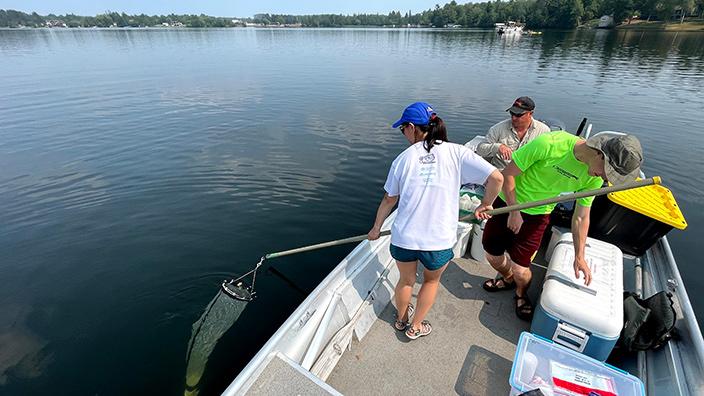Featured Services

Program Overview
We believe that humans can live sustainably with our aquatic resources, ensuring plentiful clean water for future human generations while also supporting the ecosystems that we value and that support our recreation, businesses, and industries. Our teams develop tools and techniques that help society move into this sustainable future, characterizing, measuring and documenting the improvements made along the way. We also provide research, methods development, new technologies, and analysis services to support this vision and our clients.
Program Goals
Develop science-based tools, materials and technologies to assess and protect our water resources, and restore them if degraded.
Unique Strengths, Expertise and Capabilities
Our interdisciplinary team of experts in data science and the fundamental biological and chemical aquatic sciences work together to develop various applications for natural and engineered aquatic systems, including aquatic ecosystem restoration, water treatment and remediation, and water quality monitoring and management. By incorporating an understanding of natural environmental processes, science and engineering fundamentals, we apply a systems-based approach to develop holistic solutions to pressing environmental problems.
Research Labs
- Freshwater Ecosystem Research and Monitoring Lab: Faunal AIS, fish, aquatic macroinvertebrates, zooplankton research
- Lake and Stream Ecosystem Ecology Lab: State-certified water chemistry analyses
- Environmental Microbiology and Biotechnology Lab: Microbial solutions to environmental pollution
- Environmental Chemistry Lab: Researching contamination solutions
- Phytoplankton and Paleolimnology Lab: Using algae to indicate environmental conditions
- Water Treatment Pilot lab: Beneficial reuse of waste materials
Featured Video
Staff
Related News

NRRI cross-disciplinary research explores availability of food sources for declining species of bug-eating birds.

NRRI’s early data analyses show surprising concentrations in the deep middle of lake, not just near shore

We dug back into the archives to find NRRI's original crayfish research and the start of The Crayfish Lab at NRRI Duluth.

NRRI tests techniques to clean boat interiors to stop spread of invasives.

Invasive ‘rusties’ add another challenge to growing Minnesota wild rice.

The Society for Freshwater Science announced that it will present its 2024 Career Award for Environmental Stewardship to Dr. Lucinda B. Johnson, NRRI Senior Research Fellow.

NRRI scientists present findings on projects with broader water community.

UMD master's graduate goes all in for aquatic chemistry for environmental protection

Enthused by ‘all things science-y’ makes NRRI a good fit for this microbiologist.
Media Coverage
- – UMD researchers tackle how to remove invasive species inside boats – Duluth News Tribune
- – Green Visions: St. Louis River Estuary Algal Blooms – WDSE The North Radio
- – Study: Wildfire led to poorer water quality in northern Minnesota lakes – MPR News
- – New study reveals Greenwood fire’s impact on nearby lakes – Northern News Now
- – How does a forest wildfire affect water quality? – Quetico Superior Wilderness News
- – Researchers study water quality impacts following 2021 Greenwood Fire – WTIP
- – Wildfires contribute to nutrient-rich, murky water in lakes – Phys Org
- – Wildfires contribute to nutrient-rich, murky water in lakes – University of Minnesota Research Brief
- – ‘Rock snot’ continues to threaten biodiversity in many North Shore rivers and streams – WTIP
- – Wetlands were everywhere on the Great Lakes, how one project is helping save them – Milwaukee Journal Sentinal
- – Researchers in Duluth turn streams purple to help measure effectiveness of restoration – MPR News
- – Researchers studying restoration at Mission Creek using new dye technique – WDIO
- – St. Louis River water quality project launched by NRRI, others – Hometown Focus
- – New Grant To Increase Water Quality Monitoring in St. Louis River Estuary – Fox 21 Local News
- – Northern Minnesota researchers close in on sulfate pollution solution – MPR News
- – What is Blue-Green Algae? A Conversation with Dr. Chris Filstrup from NRRI – KAXE radio
- – UMD scientists study phytoplankton, the base of Great Lakes food chain – Duluth News Tribune
- – Duluth-based scientists get $3 million grant to study Great Lakes' phytoplankton – Star Tribune
- – Scientists get grant to monitor bottom of Great Lakes food chain – WDIO
- – Damming research: Study finds beavers might not be all bad for trout streams – Duluth News Tribune
- – Scientists using DNA to track invasive species – Duluth News Tribune
























